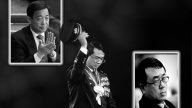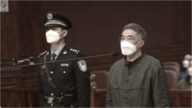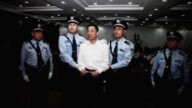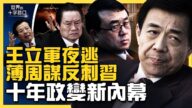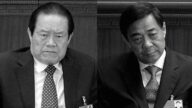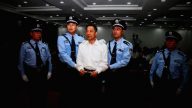【新唐人2013年03月12日訊】中央政治局委員兼重慶市委書記孫政才,日前出席「兩會」記者會時表示,薄熙來案件已移送司法機關,目前案件的偵查情況正在依法進行當中。如何審判前重慶市委書記薄熙來﹖被指為習近平「跨不過的火焰山」,和中共的「燙手山芋」。同時,中共能否對薄案進行公開的審判﹖網民們普遍質疑!
香港媒體曾經披露,薄熙來落馬後,始終不願配合中紀委調查,並要求與中共某高層領導直接談判。另有中共司法界高官單獨與薄談判,表示:只要薄熙來配合審理可以寬大處理,但遭薄熙來拒絕。薄熙來表示,他願意接受公開審判,只要中共當局以政治立場或路線錯誤來懲處他,但堅拒貪污、和重大瀆職等刑事定罪。
另一方面,中共能否對薄案進行公開審判?網民普遍提出質疑!
北京市民張雪娟在網上向當局提出五點疑問,其中包括薄熙來如何混進中共黨內,進入高層進行篡黨奪權?以及貪污受賄和亂搞兩性關係等﹖她還要求當局公布確實證據,來證明薄熙來的罪行。
時事評論家橫河向《新唐人》表示,按常規來說,薄熙來案在兩會之前就應該審理。
時事評論家橫河:「因為畢竟這件事情是胡、溫統治下發生的事情,也應該在胡、溫統治時期把它結案,把它拖到下一任領導人—-不管把它當政績也好,把它當包袱也好,都不是非常正常的。」
從中共「十八大」到「兩會」之間的三個多月,中共當局一直沒有審理薄熙來,橫河認為是牽涉「投鼠忌器」的問題。
橫河:「薄熙來實際上是在(政治)路線上面對中共造成了一個威脅,他以地方治理在思想路線上獨自搞了一套,而形成了對中央的挑戰,所以要隨隨便便的就此以一些貪腐罪把他定罪的話,就比較困難。第二個就是,中共的政策、中共的思想路線,中共的具體政策,中共整體的貪腐,所有這些都使得對薄熙來的審判,有投鼠忌器的問題—-怎麼打了他以後,不把中共自己打倒了!?」
橫河指出,真正能夠把薄熙來拿下去的罪名,影響中共合法性。因此不讓中共跟著薄熙來一起倒下去,是中共當局審判薄熙來考量的重點!也是最困難的地方。
橫河:「比如說,他在重慶打黑的時候侵犯人權,而且酷刑逼供,這些就容易把他打下去,但是,還有跟活摘器官有關的。像這種嚴重侵犯人權的行為,如果把它揭出來的話,也可以把他給打下去的。」
所以,橫河說,薄熙來已有充分的罪名接受審判,但是,需要他在審判中配合中共當局!
橫河:「為甚麼呢?因為在中共的高層裡面,沒有不貪腐的,比他要貪腐得厲害的肯定還有,而且到了他這個層次以後,他們互相之間是知道的,所以並不是在於能不能給他定罪,而是在於:如果他不配合的話,他在法庭上說,你要是給我定這樣罪的話,那麼,比我嚴重的人多得多,他在法庭上把這些揭出來怎麼辦?這是當局必須要他配合的主要因素。」
還有評論人士認為,審判薄熙來是習近平「跨不過的火焰山」,是考驗習近平的魄力,謀略,和智慧的觀察點和試金石。因為,一來習近平處於「保黨與反腐之兩難」,二是「真,假打大老虎之兩難」,三是兌現承諾(不允許任何人超越憲法)與處理特權之兩難。
不僅全中國人民翹首以盼薄熙來被公開審判,同時,全球的目光也被他吸引。橫河認為,三個月過去了,薄熙來案件已經無法再拖延,中共當局只能硬著頭皮開審。
採訪/常春 編輯/周平 後製/鍾元
Bo Xilai Trial: Will the Regime Stop Kicking the Can?
Sun Zhengcai, incumbent Chongqing Party chief, recently
commented during a “Two Sessions” press conference.
The case of Bo Xilai has entered into legal proceedings,
and the investigation is now under way.
How will the trial of Chongqing’s
former Party chief Bo Xilai unfold?
The case is deemed as an insuperable barrier for Xi Jinping,
and a hot potato for the Chinese Communist Party(CCP).
Will Bo Xilai receive a public trial? It has
been widely questioned by netizens in China.
Hong Kong media revealed that jailed Bo Xilai
has refused to cooperate with investigation by
the Central Commission for Discipline Inspection.
Reportedly, Bo asked to negotiate
directly with a specific top CCP leader.
In a negotiation, a senior judicial officer told Bo that
he will get lenient treatment if he can cooperate with
the investigation. However, Bo refused to cooperate.
Bo said that he would be willing to accept a public trial
for the allegations of taking a wrong political stance.
Bo has firmly fought criminal charges of corruption,
and serious dereliction of duty, said the news report.
Will the CCP stage a public inquiry into the case of Bo Xilai?
This has been widely doubted among China’s netizens.
Beijing resident Zhang Xuejuan
raised five queries on the internet.
Two of them questioned, how did
Bo Xilai plan to seize power from the CCP?
How did Bo commit corruption and
what was his involvement in adultery?
Zhang asked the authorities to publicly
release the firm evidence of Bo’s guilt.
Critic Heng He commented that conventionally, the case
of Bo Xilai should have been tried before the Two Sessions.
Heng He: “These accusations were brought against
Bo Xilai during the tenure of Hu Jintao and Wen Jiabao.
So, it should have been closed
under the Hu-Wen administration.
It’s not quite normal to leave it to the new leaders,
as a work performance or as a historical burden.”
Bo Xilai did not face trial during the three-month interval
between the 18th CCP Congress and the Two Sessions.
Heng He interprets that this is due to CCP’s
fear that the trial may get the CCP into trouble.
Heng He: “Bo actually posed a threat to the
CCP central authorities, by making his own
local governance and ideological line.
So it’s not convincing to convict him of corruption.
Also, the trial of Bo will involve the CCP’s policies,
ideological line, and the Party’s overall corruption.
All these have made the case become of an
issue of concern for the stability of the Party.
That is, wouldn’t it lead to collapse of the
CCP itself, by striking against Bo Xilai?”
Heng He indicates the most convincing conviction of Bo’s
guilt will negatively impact on the CCP’s ruling legitimacy.
Thus the key focus that the CCP considers is how to
prevent the party from collapsing, alongside Bo’s end.
This is the hard nut to crack that the regime faces.
Heng He: “These include his [Bo’s] violations of human
rights during the anti-corruption campaign in Chongqing.
It also includes his crime of extracting
confession through use of torture.
This is evidence that can take him down very easily.
But his involvement in organ harvesting are
far more serious human rights violations.
The exposure of this can also convict Bo Xilai.”
Heng He says there is abundant proof of Bo’s guilt.
But what the CCP needs Bo to
do is to cooperate during the trial.
Heng He: “Why does it make such a demand? It
is because all of the CCP top officials are corrupt.
There must be officials with more severe corruption,
and as high-ranking, and who all know about it.
So the question is not that Bo cannot be convicted
but that he might not cooperate in the court.
He may question his convictions, in light of
other officials with more serious corruption.
So this is a major factor that the CCP
authorities want him to cooperate with.”
Some commentators say that the trial of Bo Xilai
is an insurmountable obstacle for Xi Jinping.
It is a touchstone that tests Xi’s
courage, stratagem, and wisdom.
They think that Xi is now caught in a dilemma;
of keeping CCP rule and fighting corruption;
of a real purging of high-ranking corrupt
officials, and of it not being just a show;
of fulfilling his promise that no one is above the Constitution,
and of dealing with corrupt high-raking officials.
Now the public trial of Bo Xilai is not only expected by the
Chinese people, but has also attracted international attention.
Heng He says now three months is over, the CCP
cannot kick the can down the road any further.
Thus, the authorities have to bite
the bullet and put the case on trial.


